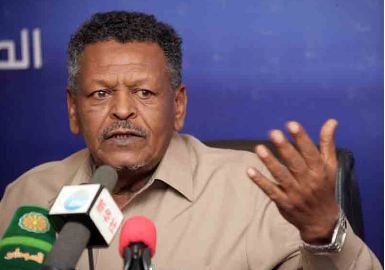Sudan, S. Sudan discuss arrangements to open border crossings
February 25, 2018 (KHARTOUM) Sudan’s First Vice-President and Prime Minister Bakri Hassan Salih has discussed with South Sudan’s Presidential Advisor Tut Kew Gatluak arrangements to open border crossings between the two countries.

Following the meeting, Gatluak told reporters the meeting discussed ways to enhance bilateral relations to serve the common interests of the peoples of the two countries.
He pointed out that they also discussed the ongoing arrangements to open the border crossings between the two countries, stressing his country’s readiness to open the crossings and promote trade exchange with Sudan.
Earlier this month, Sudan announced the resumption of the border trade with South Sudan upon directives of President Omer al-Bashir to activate the border trade with the neighbouring countries.
A government delegation headed by the Minister of Commerce Hatim al-Sir and including the Director of the Standards and Metrology Authority, Director of the Customs Police, Central Bank of Sudan, security department at the security services, businessmen visited White Nile State on 12 February to announce the resumption of border trade between the White Nile State and South Sudan.
South Sudan seceded from Sudan on July 9th, 2011 following a referendum on whether the semi-autonomous region should remain a part of the country or become independent. 99% of the southern voters chose independence.
Relations between the two nations soured after South Sudan’s independence following a series of disputes over a number of issues.
In September 2012, both Sudan and South Sudan signed a series of cooperation agreements, which covered oil, citizenship rights, security issues, banking, border trade among others.
In March 2013, the two countries signed an implementation matrix for these cooperation agreements. However, the execution of the agreements didn’t go according to the plan.
(ST)
